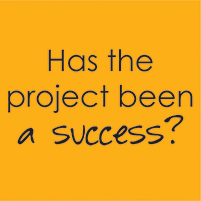Quite often when a project finally ends, no one has the time or inclination to even ask, “Has it been a success?” But actually, when a project closes out, a rare opportunity is presented to evaluate what worked and what didn’t, and more importantly to capture lessons learnt. It really surprises me that many organisations turn a blind-eye when it comes to evaluating completed projects – not only to the detriment of future success, but also for projects running longer than a year. This also presents an opportunity to conduct end-of-phase reviews.
So, how can the success of a project be appraised?
Before this question can be answered, you must establish what the objectives were to start with. Curiously, a lot of projects are still undertaken without proper planning and where the objectives have not been clearly defined, prioritised and linked back in some way to a business benefit. Only a few companies, still to this day, stringently assess project worthiness, benefits and payback, and, as a result, the “white elephant” projects go marching on until completion. The age-old “GO/ NO GO” – as prescribed in many project textbooks – needs to be taken more seriously by project committees.
Therefore, when evaluating the success of a project, begin by understanding the business reasons for the change. Why was it started in the first place? And then ask:
- Has it been a good investment?
- Have people been able to come to grips with exactly what is being delivered, and were their expectations effectively managed and aligned throughout?
- Did you work well as a project team and how well did you execute the tasks at hand?
- Can the organisation sustain and operationally handle the changes going forward?
- Are you realising the pursued benefits?
Assuming the project has adequately delivered the promised business benefits after an inquiry with the key stakeholders – and the stakeholders accept that their requirements were sufficiently understood and addressed – the next question to ask is whether or not the project activities were carried out within the confines of scope, time and cost – taking into account approved and controlled requirements, schedule and budget adjustments. No-one expects everything to go according to the baseline plan, but well-kept records are imperative for measuring success. Being able to show the baseline, tracking of the actuals and approval of major deviances, as well as related communications, documents and sign-offs are important factors for the post-project review.
Ultimately, I believe that the success or failure of a project is in the eyes of the project customer(s) and the people who need to live with the change after the project team has disbanded. Find out what people are saying about the change. Change fatigue is a symptom of too much disparate and unmanaged change being flooded into the workplace, leaving employees feeling constantly bombarded. If employees are unable to keep up and perform optimally as a result of poorly integrated change, then normal business operations can be noticeably compromised, and people will moan about it. Understanding whether or not your project successfully transitioned people to the changed state or left them “change fatigued” is an important question to ask. Did the necessary up-skilling, communication, dialogue and support take place with affected people in the workplace?
Measuring the success therefore requires more than a mere nod of acceptance. Involve key stakeholders and team members in the evaluation process to provide their individual stories on what went right, what went wrong, what was missed and recommendations for the next time around. Consolidate these stories and findings into your final project review report and distribute to all parties for consensus. Then, by all means, celebrate your success and shout it from the rooftops, before rolling the credits on your project.
After all, closing out a project successfully is part and parcel of a successful project.
Author Bio
Caroline Lowings is the principal consultant at Change Story, a Gauteng-based consultancy providing focused change management and strategic planning services to clients. Caroline has over 15 years’ experience working, consulting and advising on complex projects in complex change environments. For more information, go to http://www.changestory.co.za



